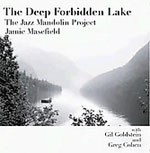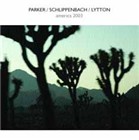Home » Jazz Articles » Album Review » The Jazz Mandolin Project: The Deep Forbidden Lake
The Jazz Mandolin Project: The Deep Forbidden Lake
Far from the densely-layered contemporary approach of the previous JMP album Jungle Tango (2003), The Deep Forbidden Lake is as pure and simple as its black and white cover photos. Yet its availablity is inextricably tied to the technology of the new millennium: if you buy the CD online from the band's website, you are provided access to a digital package titled "The Navigators Bundle, including photos, sheet music charts, notes from Masefield, and four extra songs. Perusing this material, in combination with hearing the rehearsal recordings and outtakes, makes the production of The Deep Forbidden Lake all the more impressive: it may have taken only two official days to record, but the preparation, in both thought and execution, was meticulous.
Like another bastion of contemporary jazz, Pat Metheny, Jamie Masefield avails himself of two main routes of improvisation: stretching out songs and working his way into songs. Again in contrast to previous releases (such as the loose After Dinner Jams), the latter approach takes precedence here, Masefield's accompanists providing the setting that contrasts the fine detail of his own playing. Goldstein's lush piano work is the melodic counterpart to Cohen's deep rumbling bass on the European flavored "Tears and "Black and White. All three bring a light touch to Tom Waits' "Ol' 55, and it's little wonder that two Neil Young tunes keynote the album: besides the title track, the plaintive yet sweet strains of "Wintersong provide an ideal opener, because there's not a whit of saccharine sentimentality to be heard.
The simplicity of Masefield & Co's approach here is deceptive, as if the inclusion of material by Ornette Coleman ("When Will the Blues Leave ) next to Radiohead ("Everything in the Right Place and "I Will ) doesn't give you pause. No matter how many times you listen to The Deep Forbidden Lake—and it is so easily accessible, chances are you will play it constantly—you will be entranced by it. Jamie Masefield's recounting of the production may explain, up to a point, how the album, as he originally envisioned it in the wake of JMP's tenth anniversary, came to fruition—but it doesn't taint the mystery of it, the likes of which emanates from great music of all kinds.
Track Listing
Wintersong; Ol' 55; Hallelujah; Tears; Peace; Everything in its Right Place; My Litte Brown Book; Tom Traubert's Blues; Black and White; I Will; The Deep Forbidden Lake; When Will the Blues Leave
Personnel
Jazz Mandolin Project
band / ensemble / orchestraJamie Masefield (mandolin, mandola on "Tears"), Gil Goldstein (piano, accordion, toy piano on "When Will the Blues Leave"), Greg Cohen (upright bass)
Album information
Title: The Deep Forbidden Lake | Year Released: 2005 | Record Label: Lenapee Records
Tags
About Jazz Mandolin Project
Instrument: Band / ensemble / orchestra
PREVIOUS / NEXT
Support All About Jazz
 All About Jazz has been a pillar of jazz since 1995, championing it as an art form and, more importantly, supporting the musicians who make it. Our enduring commitment has made "AAJ" one of the most culturally important websites of its kind, read by hundreds of thousands of fans, musicians and industry figures every month.
All About Jazz has been a pillar of jazz since 1995, championing it as an art form and, more importantly, supporting the musicians who make it. Our enduring commitment has made "AAJ" one of the most culturally important websites of its kind, read by hundreds of thousands of fans, musicians and industry figures every month.





















